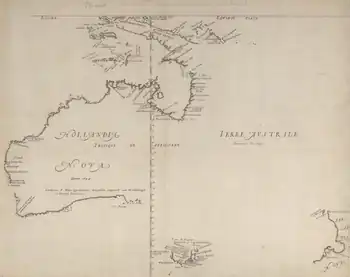Geography of Rottnest Island
Rottnest Island lies 18 kilometres (11 mi) west of the coastline of Perth, Western Australia; it is 4.5 kilometres (2.8 mi) at its widest and 11 kilometres (6.8 mi) at its longest.[1]

Coastline features
The coastline is approximately 24 kilometres (15 mi) long. Bays, points, reefs and smaller islands along this coastline are extensively named.
Topography
The named hills of Rottnest are Wadjemup Hill, Oliver Hill, Radar Hill and Mount Herschel. Of these Wadjemup Hill is the highest, at 45 metres (148 ft), and the location of the Wadjemup Lighthouse.[2]
Named coastal features
Bays, coves and beaches
- Basin (usually known as The Basin)[3]
- Bickley Bay – just south of Kingstown Barracks
- Catherine Bay
- City of York Bay[4] – west of Little Armstrong Bay
- Eagle Bay – at the West End
- Fay's Bay
- Fish Hook Bay
- Little Armstrong Bay
- Little Parakeet Bay
- Little Salmon Bay
- Longreach Bay – between the Basin and Geordie Bay
- Mabel Cove
- Marjorie Bay
- Mary Cove
- Nancy Cove – narrowest part of Island
- Parakeet Bay
- Ricey Beach
- Porpoise Bay (also known as Salmon Bay)[5][6]
- Rocky Bay
- Stark Bay
- Strickland Bay[lower-alpha 1]
- Porpoise Bay
- Thomson Bay - the main bay on the coast adjacent to the main settlement Thomson Bay settlement[8]
- Wilson Bay
Points Islands and rocks
- Abraham Point
- Armstrong Rock
- Bathurst Point – location of the Bathurst Lighthouse
- Bickley Point
- Cape Vlamingh – also known as West End
- Cathedral Rocks – north west of West End
- Crayfish Rocks
- Duck Rock
- Dyer Island
- Fairbridge Bluff
- Green Island
- Henrietta Rocks
- Mushroom Rock
- Narrow Neck
- North Point
- Parker Point – southernmost point[9]
- Phillip Point
- Phillip Rocks
- Pinky Beach
- Radar Reef – at West End
- Salmon Point
- South Point
- Vera Rocks
- Wallace Island
- West End
Structures
- Kingstown jetty
- Thomson Bay jetty
Named lakes
- Garden Lake
- Geordie Bay
- Government House Lake[10]
- Lake Baghdad
- Lake Herschel/ Herschel Lake
- Lake Negri[11]
- Lake Sirius
- Lake Timperley
- Lake Vincent
- Pearse Lake
- Serpentine Lake[12]
Wells and bores
The island is very limited in water supply and considerable numbers of bores have been sunk to keep water supply available.[13]
In 1976, Philip Playford's Geological Map of Rottnest[14] identified wells, abandoned wells, and bores on the island. The following is only a select list of the full range.
West end
- Radar Hill just east of Cape Vlaming had Radar Station Well and was designated "abandoned".
South coast
- Parker Point between Salmon Bay And Porpoise Bay, had Parker Point Bores as "abandoned", closer to Tree Hill the well and bore were active.
See also
- Rottnest Island shipwrecks — details on the twelve larger shipwrecks in close proximity to the island
- Colonial buildings of Rottnest Island
- Islands of Perth, Western Australia
Notes
- Known as 'Narrow Neck Bay' until changed to 'Strickland Bay' in 1913.[7]
References
- "Rottnest Island". Department of Biodiversity, Conservation and Attractions. Government of Western Australia. 6 June 2023. Retrieved 13 October 2023.
The island is 11 kilometres long and 4.5 km wide at its widest point, with a land area of 1859 hectares and an associated marine reserve of some 3800 hectares.
- Heritage Council (31 December 1993). "Rottnest Island Light Station". Register of Heritage Places. Heritage Council of Western Australia. p. 4. Retrieved 15 October 2023.
- Orloff, Izzy; HRRC (1922). "The Basin, Rottnest". Archived from the original on 8 March 2016. Retrieved 15 October 2023.
- "Frogmen Will Seek Ship's Anchor". The West Australian. Vol. 70, no. 21296. Western Australia. 23 October 1954. p. 10. Retrieved 15 October 2023 – via National Library of Australia.
- "Rottnest Island: some historical notes". Western Australia. n.d. Retrieved 15 October 2023 – via Trove.
Willem de Vlaming [...] landed on Rottnest on the 30th December, 1696 in what is now called Salmon or Porpoise Bay
- "Vlamingh and Rottnest Island (1696). (26 March 1952)", The bulletin, John Haynes and J.F. Archibald, 73 (3763): 18, 26 March 1952, ISSN 0007-4039
- "Rottnest Island". The West Australian. Vol. XXIX, no. 3464. Western Australia. 21 May 1913. p. 9. Retrieved 15 October 2023 – via National Library of Australia.
- "Thompson's Bay, Rottnest Island, showing the forshore of the new camping ground". Western Mail. Vol. XXVII, no. 1, 396. Western Australia. 27 September 1912. p. 33. Retrieved 7 July 2023 – via National Library of Australia.
- "Mackerel Off Parker Point". The Daily News. Vol. LXVII, no. 23, 086. Western Australia. 8 April 1949. p. 10 (HOME). Retrieved 22 May 2022 – via National Library of Australia.
- "YACHTING". The West Australian (Perth, WA : 1879 - 1954). Perth, WA: National Library of Australia. 5 April 1926. p. 10. Retrieved 11 December 2015.
- Anwar, Faisal; Sarker, D.C; Bato, N.G (2015), Freshwater seepage flow to salt lakes of Rottnest Island, Western Australia, IAHR, ISBN 978-90-824846-0-1
- "ROTTNEST SALT INDUSTRY". The West Australian. Vol. XXXVI, no. 5, 586. Western Australia. 9 March 1920. p. 4. Retrieved 22 May 2022 – via National Library of Australia.
- Smith, RA (1994), "Groundwater Exploitation and Management on a Small Semiarid Island", Water Down Under 94: Groundwater/Surface Hydrology Common Interest Papers; Preprints of Papers, Institution of Engineers, Australia: 473–478, ISBN 978-0-85825-607-1
- Playford, Phillip E. (Phillip Elliott); Leech, R. E. J; Geological Survey of Western Australia (1977), Geological map of Rottnest Island, Geological Survey of Western Australia (published 1976), ISBN 978-0-7244-6399-2 see also later edition in 1992 Playford, Phillip E. (Phillip Elliott); Leech, R. E. J; Geological Survey of Western Australia (1992), Geological map of Rottnest Island, Geological Survey of Western Australia, retrieved 11 December 2015
